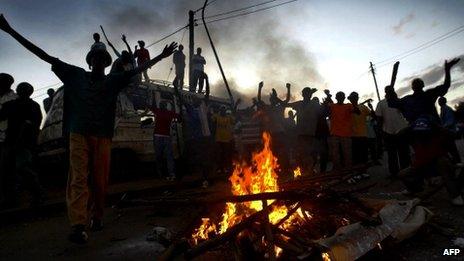Kenya election: rape victim fears repeat of 2007 ordeal
- Published

Amidst the violence that followed the disputed Kenyan election in December 2007, reported cases of rape and sexual attacks against women doubled, according to the UN. Now - ahead of elections next week - one rape victim told the BBC that she is leaving the capital Nairobi out of fear of being attacked again.
"It was election day," recalls Audrey (not her real name). "I went out and voted, and came back home."
"Trouble started at around 01:00 that night. Three men broke into my house, dragged me out and raped me in a gulley nearby."
Her hands were tied together with looted power cables. One of the men covered her eyes with a piece of cloth, while the other two took turns raping her.
She thinks the men were in their twenties, but since power had been cut when the rioting started, everything happened in darkness.
When the men were finished, they looted the house and left. She dragged herself back to the house.
Unable to move
Audrey recalls being in extreme pain - her throat was hurting from futile attempts to fight off her attackers. She had also sustained serious injuries to her bladder and her kidneys.
And - as she had been held down - the three men had hurt her legs, so she was unable to move and get help.
Finally, after a week unable to leave her house, she says her neighbour became worried and alerted her family.
Her mother and her sisters took Audrey to Kenyatta National Hospital in Nairobi. The hospital has a special unit for victims of sexual violence, where patients are offered medical, psychological as well as legal support. She was there for a month.
Before the violence erupted, Audrey had operated a food kiosk in Kibera, a slum in Nairobi. But after leaving the hospital, she had to be looked after by her family for another two months.
Her business had collapsed by the time she was strong enough to work again. Today she washes clothes for a living.
Lawlessness
Since she was admitted to hospital, she has been looked after by Coalition on Violence against Women (COVAW), a Kenyan human rights organisation, who provided legal support and counselling for five years.
And with psychological support she was finally able to disclose to her family the details of what had happened. Audrey's family knew about the attack, but they didn't know that she was gang-raped.
COVAW estimates that more than 3,000 incidents of sexual violence were committed after the 2007 election.
"Many of the women who were raped at the time were infected with HIV," says Alice Mutuma who works for the group. "Some of them have had children. And the women are unable to explain to them that they are children born from rape."
"The government seems to have moved on," she says, "yet these women, and there are many many more, still live with the same pain."
COVAW has also been providing legal support for women like Audrey. Both Ms Mutuma and Audrey think that the attack was symptomatic of the lawlessness and violence in post-election Kenya at the time.
"They were attacking any woman," says Ms Mutuma "They didn't care about ethnicity, age or political affiliations."
Reparations
"It's a very painful situation. For five years we have been hoping the government would do something," she adds. "Those men need to be prosecuted. Justice needs to be served. They know the men who raped them. They live with them. They have to be taken to court."
Audrey wants an apology and reparations from the Kenyan government, who she accuses of failing to protect her or investigate the crimes committed against her.
With the help of the NGO, she and seven other victims of sexual violence have now decided to sue the Kenyan government and have filed a case at the Nairobi High Court.
"It has been a long process, we started working on this case at the beginning of 2011," says Ms Mutuma.
She explains that getting the victims to agree to speak up about what happened was the most arduous task.
"We have been counselling them for the last five years. We told them that silence kills, and that they had to come out and say openly that they were raped - so something can be done."
For Ms Mutuma, even managing to file a case in court is a major achievement.
Meanwhile, Audrey worries there will be more violence in the wake of the upcoming elections.
"I am planning to leave my home in Kibera, on the outskirts of Nairobi, to stay with my family in the village until the election is over," she says.
She had initially decided she was not even going to vote, but now she wants to cast her ballot, even though she fears for her safety.
"My prayer is that nobody else will have to experience again what happened to me."
Audrey and Alice Mutuma were interviewed by Julian Keane for Newsday on the BBC World Service